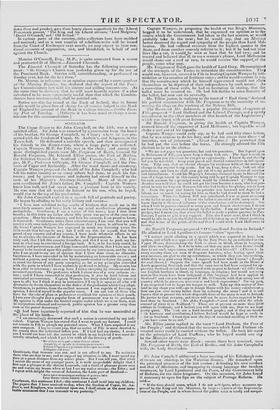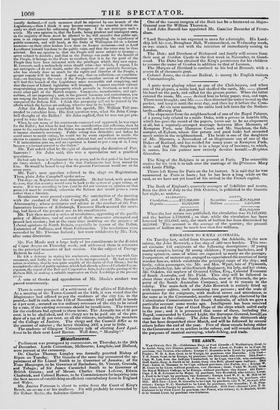Sir John Campbell addressed a large meeting of his Edinburgh
con- stituents on .Mondity, in the Waterloo Rooms. He remarked upon the principal measures of the last session ; defending his own conduct and that of Ministers, and impugniog in strong language the insolent treatment, by Lord Lyndhurst and the Peers, of the Government bills of Reform, for the three kingdoms. On this occasion, Sir John found it necessary to open his lips on the subject of Peerage Reform. lie said- " If the time should come, which I do not antieipate, when measures ap- proved by the King sod his Ministers, by huge of the Representa- tives of the People, and in whose favour the public voice is loudly and unequi-
vocally declared,—if such measures shall be rejected by one branch of the Legislature,—then I think it may become necessary to consider to what re- medy we shall resort for reforming the Peerage. I do not anticipate such a
crisis. My own opinion is, that the Lords, being prudent and intelligent men, as the majority of them must be allowed to be, will consider that public opi- nion is an important element and ingredient in weighing the expediency of public measures, and will bend, as the Duke of Wellington did on a former occasion—as their other leaders hue done on former occasions—and as Lord Lyndhurst himself has done to the public voice, and that the crisis may be thus averted. But my opinion is, that the People will never submit to tyranny— never submit to misrule ; and that as the Peerage was made for the benefit of the People, it belongs to the Peers to recollect, that ills for the good of the People they have been intrusted with the privileges which they now enjoy. If, however, such a melancholy crisis should arise—but which, I repeat, I do not anticipate—I do not doubt, under the auspices of our patriotic Sovereign, who has already done so much for the rights and liberties of the People, a proper remedy will be found. I again say, that on reflection—on considerae tion—on listening to the voice of the People—another session of Parliament will find this branch of the Legislature more reasonable and complying, and that the cause of Liberal legislation will triumph. I cannot conclude without congratulating you on the prosperity which prevails in Scotland, as well as in every other part of the British empire. Commerce, manufactures, and agri- culture, all are improving ; and, in the general harmony and contentment, you are reaping the benefit of the exertions you made in favuur of libel ty when you conquered the Reform Bill. I think this prosperity will not be marred by the efforts which the faction are making, whoever may be its leaders." After Sir John bad concluded his speech, Mr. William Tait pro- ceeded to catechize him. His first question was, what Sir John Camp- bell thought of the Ballot? Sir John replied, that be was not yet pre- pared to vote for it— When he saw many of his contituents concussed and oppressed, he was eager for the Ballot ; but when he had time for consideration and reflection, then he came to the conclusion that the Ballot was an evil, and not to be resorted to until it became absolutely necessary. l'ublic voting was desirable; and before he could resort to secret voting, he would try by every expedient to enable the elector to exercise his tight of franchise, without fear and without intimidation. " If intimidation goes on, and no expedient is found to put a stop at it, I may become a reluctant convert to the Ballot."
Mr. Tait asked what he thought of shortening the duration of Par- liaments ? Sir John said, this was a speculative not a practical question— lie had only been in Parliament for six years, and in that period he had been six times elected. (Laughter.) So that Parliaments hail been annual for him. He would be bound to say that the present Parliament would not sit for seven years. Mr. Tait's next question referred to the clogs on Registration. Then, plain John Campbell spoke out— 'f he clogs on Registration were abominable. He hail heard, with pain and distress, that this cumin y would soon be back to the system of paper voting, or worse. If it was according to law, (and he did not venture an opinion on that point,) it most be rectified, otherwise the Reform Act would prove a curse rather than a blessing.
Resolutions were passed expressing the satisfaction of the meeting with the conduct of Sir John Campbell, arid also of Mr. Speaker Abercromby ; whose assistance and advice in the conduct of the Par- liamentary business of Edinburgh, Treasurer Black assured the meet- ing, bad been of the greatest use to his constituents. •.
Mr. Tait then moved a series of resolutions, approving of the pacific policy of Ministers, and of several of their measures attenipted and passed last session ; but at the same time insisting on the progress of Liberal opinions in North Hi itain, especially in favour of the Ballot, Extension of Suffrage, and Short Parliaments. The resolutions were seconded by Mr. Thomas Ireland ; but were withdrawn by Mr. Tait, after some discussion.



























 Previous page
Previous page